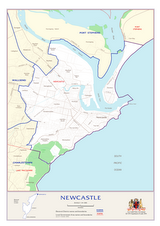Response from blog reader
There has been much media in the last day or so on the historic motion passed by Newcastle City Council. This is from today’s editorial in the Newcastle Herald with a response from the first Greens councillor on Newcastle City Council, John Sutton.
Herald Editorial:
GrandstandingMost Newcastle ratepayers are unlikely to be impressed by their councillors’ grandstanding over the mining and export of coal. The issues are ones over which the council has no control and the calls for a cap on exports and a ban on new mines ignore the complexity of the issues involved, as well as the cost to the city and region of lost jobs. The councillors should get on with the task of looking after road repairs and other council responsibilities, as they were elected to do.
[Herald, Thursday, November 9, 2006]
Response:
Congratulations Michael!
In my experience, it’s a pretty good indicator that you’re on the right track with an issue when the Herald editorial writers attack what you’re doing – especially when they drag out the old “grandstanding” chestnut, which I’ve come to realise is Herald code for “Oh, oh, it looks like people might be starting to agree with [insert almost any progressive stance here], and we just can’t muster anything substantial to say against it”.
Remember, as the voice of Hunter development interests, these editorial writers have done it for years with the Newcastle rail line. And they did it with the Crowne Plaza longwall hotel (which even local developers have now admitted is a blight on the city landscape). In fact, it’s hard to think of an occasion in recent history (certainly since the days of Denis Butler) when a Herald editorial has come out against a controversial major development proposal in Newcastle.
Unfortunately, it’s the fate of Greens to point out inconvenient truths long before the anonymous antediluvians who write Herald editorials understand what is really going on.
I’m sure you won’t be taken in by the Herald’s view that the council (the only generally elected body that can claim to represent the city) should deal only with issues such as road repairs, and not bother about big picture matters such as coal and climate change.
Are they so stuck in the old “roads, rates and rubbish” rut that the penny hasn’t yet dropped with them that climate change affects everyone, and that it’s everyone’s responsibility – including all our spheres of government? Do they really think that the council of the largest coal exporting city in the world should say nothing about this city’s role in one of the key issues facing the planet?
Perhaps they just haven’t caught up yet with the changes to the Local Government Act (1993) that gave councils the responsibility to “exercise community leadership” [cl.8(1)], and to carry out “activities to properly manage, develop, protect and restore, enhance and conserve the environment in a manner that is consistent with and promotes the principles of ecologically sustainable development” [cl.403(2)]. Lobbying and advocacy to other spheres of government in the interests of the local Newcastle community is just one example of an activity where local government can dispense this responsibility, especially when the other spheres are as Neanderthal in their thinking about these matters as … well… Herald editorial writers.
Sure, Greens councillors must attend to local issues such as road repairs, but you don’t have to ditch the planet to do this. I’m sure that you know that the voters who put you and three other Greens on Newcastle council don’t want you to ignore the larger issues facing our city and our planet, as the Herald editorial suggests.
I can assure you that when I was a councillor I received many calls from Newcastle ratepayers encouraging me to raise big picture issues, and to get the council to advocate on behalf of the local community to other spheres of government to take action on a whole range of mattes such as indigenous issues, nuclear power, waste management, public transport, air pollution, smoking, animal welfare, water pollution, planning… I could go on. The point is that people recognise and value the general governance role of modern local councils because they understand that so many of the important issues cross spheres of government responsibility, and that ecological processes especially are so damned uncooperative in appreciating the boundaries that we draw on maps, and the fine distinctions that we make in our legal instruments.
The truth is that Newcastle Council would be derelict in its duties if it said and did nothing about this issue, particularly at a time when our city, our region, our country and the rest of the world are now struggling to come to grips with the climate change challenge.
I note that the Herald editorial doesn’t explain what its authors see as the “complexity of the issue”, but I think Greens understand these well enough. We know the social and economic restructuring that will be necessary for local communities as we phase out our dependence on coal; we’re aware of the challenges of shaping an alternative energy future involving reduced levels of consumption and a shift to renewable energy sources; we understand that this is going to involve some hard decisions during a difficult transition. What the Herald editorial writers clearly don’t understand is that decisive action is now necessary – Australia can no longer afford to fiddle while the planet burns. But we also understand – in a way that the Herald editorial writers clearly don’t – that if we do act now, it isn’t all doom and gloom. For example, the Herald editorial talks of “lost jobs” in capping coal exports, but doesn’t acknowledge that coal industry jobs are in historic decline, whilst there are plenty of jobs in moving to alternative energy, as long as we don’t miss the boat.
Of course, The Greens have been saying this now for a long time, and the failure of governments (supported by industry) to take earlier action has vastly exacerbated the scale of the problem we now face. Whatever the Herald editorial writers say, it’s clear to anyone who understands this issue that the writing is on the wall for coal, and Newcastle Council has done the city, the region and the country a favour in pointing this out, and offering some suggestions for a way forward. The time for a Just Transition has come.
Don’t expect the council resolution on the coal cap and the new mine moratorium to be the end of the matter. As I discovered a number of times when I was a Greens councillor, you can expect a strong reaction from vested interests and the governments and politicians they’ve bought with their political donations.
Remember the old Gandhi line: “first they ignore you, then they laugh at you, then they fight you, then you win”.
Rest assured, it won’t be the last time that you find yourself croaking, along with the famous frog, “it’s not easy being Green”.
John Sutton
Newcastle Greens councillor (1991 to 1998)
[PS: One thing that many people don’t realise is that newspaper editorials represent the views of only a very small number of senior journalists in a newspaper. Most of the journalists who work for newspapers such as the Herald play no role at all in the views expressed in the paper’s editorial, and frequently disagree with them. We certainly shouldn’t assume that this particular Herald editorial represents the views of all (or even most) Herald journalists on the council’s role in the coal/climate change debate. Notwithstanding its consistently anti-progressive editorial stance, I believe that the Herald still plays a crucial role as a local news source, and I have great respect for the integrity and professionalism of Herald journalists with whom I have dealt over the years.]




